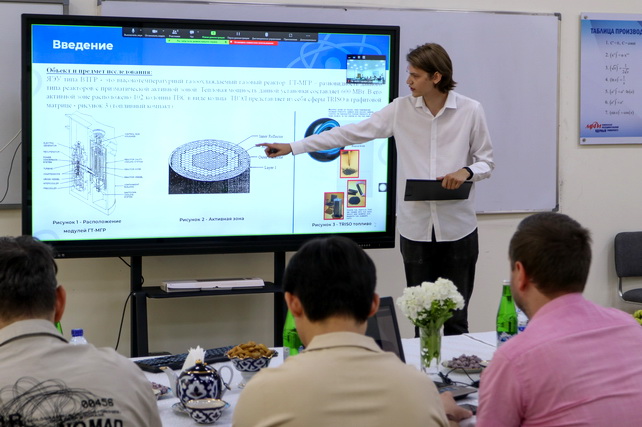
Final Thesis Defenses Conclude at MEPhI’s Tashkent Branch
Final Thesis Defenses Conclude at MEPhI’s Tashkent Branch
Tashkent, Uzbekistan (UzDaily.com) — The Tashkent branch of the National Research Nuclear University MEPhI (TF NRNU MEPhI) has concluded the final thesis defenses of its bachelor’s degree graduates in four academic programs.
This marks the third graduating class since the branch’s establishment. A total of 44 students successfully defended their theses on a wide range of topics, from nuclear technologies and thermal power engineering to hydro and nuclear energy, as well as renewable energy sources.
According to members of the examination board, the quality of the theses remains high, with several projects having direct practical relevance to Uzbekistan’s energy sector. This, they say, reflects the rigorous selection process at every stage of the bachelor's curriculum — gaining approval for defense and then receiving commission recognition is no easy feat.
"This year, we saw a very high standard of final projects, both in terms of content and evaluation. Most students earned good or excellent grades, and many have been recommended for admission to master's programs. The topics covered were diverse, and the state examination board, including invited experts from various fields, highlighted the students’ strong theoretical foundation in mathematics and physics," noted Yuri Maslov, Acting Director of the TF NRNU MEPhI.
He emphasized that special interest was shown in projects focused on the design, modernization, and operation of nuclear power plants, including future energy blocks planned for construction in Uzbekistan. Some students presented innovative reactor designs based on cutting-edge Gen III+ and even Gen IV prototypes. Among these were developments involving gas-cooled technologies, considered promising for Uzbekistan’s energy future.
Evaluation commissions — comprised of faculty and industry experts — also noted the range of topics and the strong academic background of the graduates. Fifteen of the 44 theses were developed in collaboration with industrial or scientific institutions, including JSC “Uzenergoengineering,” the Institute of Nuclear Physics of the Academy of Sciences of Uzbekistan, and JSC “Uzbek National Electric Grids.”
Eso Sadullaev, Head of Strategic Development at JSC “Uzbek National Electric Grids,” praised the students’ preparedness:
"Today’s defenses showcased exceptional student work, with four individuals earning top marks. This shows the drive of today’s youth — they understand that achieving one’s goals in life requires strong academic performance, continuous growth, and the development of both worldview and professional competence."
Sadullaev highlighted a particularly notable project on relay protection and automation systems for power grids. The graduate’s grasp of the subject and ability to solve engineering problems with innovative approaches left a lasting impression.
"These are exactly the kinds of professionals needed in our national power system, especially as we rapidly develop our trunk electrical networks, move toward digitization, and integrate renewable energy sources on a large scale. I was pleased to invite the student to join our team," he said.
Among those who stood out was Eduard Shin, who developed a connection scheme for a small-scale nuclear power plant (330 MW) to Uzbekistan’s unified energy grid. His thesis was based on a two-month internship:
"During my internship at ‘Uzenergoengineering,’ I worked on circuit design, equipment selection, and used professional software. From day one, it felt like real engineering. The shift from theory to practice was challenging, but eye-opening. Everything that seemed complicated became achievable. You just need to dive in, ask questions, and not fear the workload. This wasn’t just a thesis defense — it was a step into a profession."
Another standout example of scientific depth was the work of Dmitry Kapustin, a graduate in Nuclear Physics and Technology:
"My thesis focused on modeling a rare process — the ternary cluster fission of Californium-252. This transuranic element doesn’t occur naturally and is synthesized in reactors and particle accelerators. My research provided a theoretical explanation for experiments conducted at the Joint Institute for Nuclear Research in Dubna, where I interned in the summer of 2024. It’s a fundamental study, contributing to our understanding of rare nuclear processes. My next step is a master’s degree at MEPhI Moscow and further research in a PhD program."
Experts from Moscow also noted the rising quality of work at the branch:
"What matters most isn’t just what’s written in the explanatory note or on the slides, but whether the student understands what they did. That becomes clear through their answers during the defense. I was particularly interested in projects that used neural networks and AI to analyze data and forecast failures at nuclear plants. But it's important not to chase trends — AI should be used only where it truly adds value," said Evgeny Soldatov, Associate Professor at the Department of Elementary Particle Physics at NRNU MEPhI (Moscow).
According to the branch administration, some graduates have already received job offers. Many thesis projects were integrated into real national energy, research, and engineering initiatives.
A significant number of students plan to continue their education in master’s programs. Since the branch’s founding, 161 individuals have earned their bachelor’s degrees. This year, 28 students will complete their master’s studies, while 26 continue their education.
This progress underscores a solid connection between fundamental academic training and the continuation of scientific education.